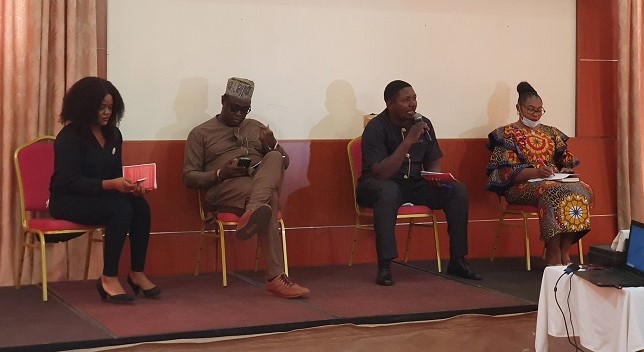“Biosafety entails protecting the ecosystem and human health from harmful incidents. This is achievable through dependable biosafety laws and regulations. Where biosafety regulations are strong, biodiversity is sure and food systems are secured.”

These were the words of the Health of Mother Earth Foundation (HOMEF) as, while intensifying efforts at promoting biosafety in Nigeria, it hosted a roundtable with lawyers and stakeholders in Abuja on November 24, 2020.
Genetically Modified Organisms (GMOs) – Emerging Technologies such as Gene Drives and Synthetic Biology, Agroecology and Biosafety Act/Regulation in Nigeria were the major issues discussed during presentations and panel discussions.
According to Nnimmo Bassey, HOMEF’s Director, modern agricultural biotechnology which threatens biosafety is promoted for two main reasons. First is to create Genetically Modified (GM) crops like GM cotton, canola and sugarbeets that tolerate herbicides/weed killers which are produced by same companies that make the GM crops. Second is to manufacture crops that kill target pests (e.g. Bt Cotton, Maize and Cowpea). These crops produce their own insecticide thus can be called pesticides and are unsafe.
There is also GMO 2.0 which is the next generation Genetic Engineering also known as Synthetic Biology or “extinction technology”. This technology, he added, is being used in different sectors – agriculture, military, health and conservation.
Ifeanyi Nwankwere, who is currently handling (with a team of experts) the court case against the approval for introduction of GM cotton and maize into Nigeria, explained the challenges of biosafety in Nigeria. According to him, the challenges are found in certain clauses in Nigeria’s Biosafety Act of 2015 which was amended in 2019.
He explained that the Act gives room for regulatory capture which occurs when a special interest is prioritised over public interest, leading to a net loss for society. This, he noed, is demonstrated by the presence of major promoters of biotechnology such as the National Biotechnology Development Agency (NABDA) on the board of the regulatory agency, National Biosafety Management Agency (NBMA), created by the Act.
Another deficiency in the Act he identified is that it institutes a fault-based type of liability and redress in which a petitioner must prove that a defendant’s conduct was either negligent or intentional. This is against “a Strict liability which is more consistent with the principle of precautionary measure as it allows imposition of liability on a party without a finding of fault (such as negligence),” Nwankwere stated.
The Precautionary Principle states that where there are threats of serious damage, lack of full scientific certainty shall not be used as a reason for postponing cost-effective measures to prevent environmental degradation. Thus, cost-effective measures such as halting promotion of GMOs should not be dependent on scientific proof.
The Act is meant to implement provisions of international treaties like the Convention on Biological Diversity and the Cartagena Protocol to the Convention on Biological Diversity on matters relating to GMOs. These treaties uphold the Precautionary Principle but “Nigerian courts are yet to take the Principle seriously”, Nwankwere lamented.
Lawyers at the roundtable agreed that threats posed by GMOs should be continuously challenged through litigations, with concerned experts in biosafety and lawyers working side by side.
Chima Williams a lawyer and Acting Director of Environmental Rights Action/Friends of the Earth, Nigeria (ERA/FoEN), thus, encouraged stakeholders to question issues of Fairness, Equity and Justice in GMO conception, development and distribution processes. The question that should be asked is: What fundamental rights are violated if the process is not equitable? Williams stressed.
Lawsuits against acceptance of GMOs in Nigeria should be based on infringements of fundamental human rights. For example, Many GM food products are not labeled for consumers to make a choice as to whether or not to buy them. Again, small holder farmers suffer economic loses and their health is also affected.
Nnimmo Bassey stated that due to use of GMO 2.0, communities that depend on the natural process of extracting fragrances from crops like vanilla are sidelined, therefore, they lose their source of livelihood to big technology-dependent industrial agriculturists.
Tatfeng Mirabeau, Professor of Medical Microbiology and Immunology at Niger Delta University, Bayelsa State, Nigeria and a panelist at the Roundtable, explained that “with GMOs, the natural constitution of target organisms is disrupted and this has implications for our environment, food systems, health and economy.”
Another panelist, Ifeanyi Casmir, a Medical and Molecular Microbiologist, affirmed that GMOs have been linked to serious health issues such as cancer, immune disorders, birth defects; soil degradation; bio- and nutritional diversity loss; impoverishment of small holder farmers and general economic loss.
He informed that a lot of experimentation with GM seeds is taking place in Kaduna State. It was also stated that GM beans has recently been approved for commercial release in Nigeria and is being distributed to farmers currently.
Jackie Ikeotuonye, Director of Bio-integrity and Natural Food Awareness Initiative and panelist at the roundtable stressed, that “GM crops are different from natural seeds and food. So, the Principle of Substantial Equivalence that GMO proponents claim is baseless.”
Corroborating Jackie’s point, Bassey informed that “GMOs cannot even exist side by side natural crops as they (GMOs) have dominant traits that they can easily pass across to the natural plants”.
Joyce Ebebeinwe, HOMEF’s Programmes Manager, stated at the roundtable that rather than a GMO-driven food system, agroecology which is the pillar of food sovereignty should be promoted.
Agroecology, she added, encourages: diversification of farming systems, use of local and improved crop varieties and livestock, minimal use of chemicals, mixed cropping, crop rotation, biological pest control, and other practices that increase productivity, promotes climate resilience, biosafety and biodiversity.
